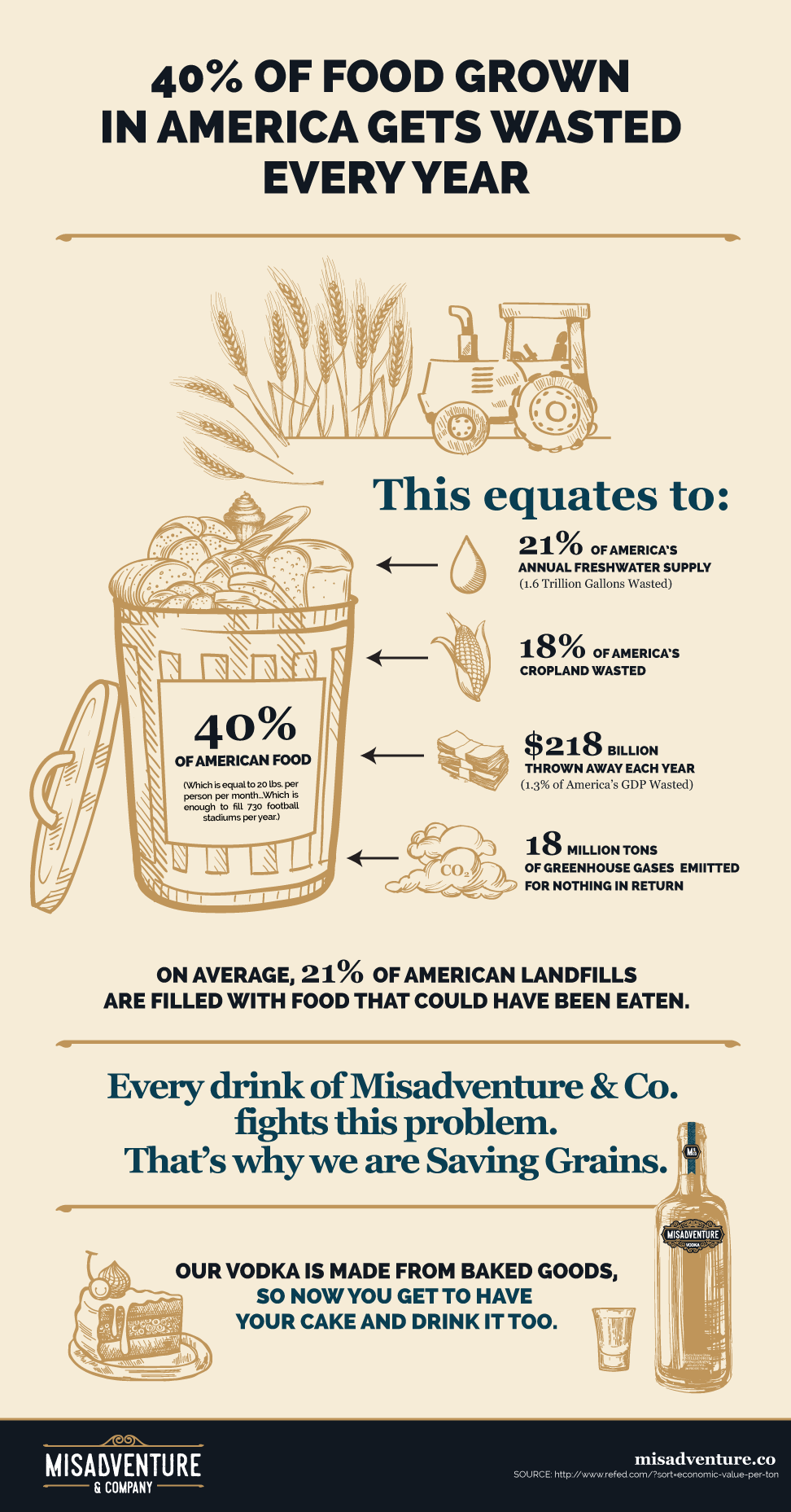
Who doesn’t love themselves a little cocktail on a Friday afternoon on a patio overlooking the sunset on the Vancouver Harbour? Better yet, the vodka in your mix is 100% sustainable and zero-waste.
As we saw in the Story of Stuff by Annie Leonard, approximately 1.3 billion tons of food – that is one-third of the world’s food, is lost or wasted. This food waste is enough to feed 870 million hungry people all over the world, and what is even more devastating is the amount of resources wasted in the process of food disposal.
Luckily, California-based distillery Misadventure & Co. has found a way to combine sustainability with the fun-loving aspects of distilled spirits, a concept called the “hedonistic sustainability” – an idea that you don’t have to punish yourself to do good. Misadventure Vodka extends the useful life of wasted baked goods saved from the landfill. This is possible because they can still contain usable starches that can be converted to sugars that are then eaten by microscopic yeast and turned into marvellous alcohol.
On one side, this idea of turning food waste into something better is definitely revolutionary and serves as a part of the solution to food loss. On the other, it provokes a more profound and deeper insight into the externalities caused by food waste. Food loss and waste amount to a major squandering of resources, including water, land, energy, labour and capital and needlessly produce greenhouse gas emissions, contributing to global warming and climate change. Recycling the foods wasted by humans sure does help mitigate landfill pollution, yet my question is: is this merely an alternative way of “carbon offsetting”?
In my opinion, one of the most crucial ways of dealing with food waste is to reduce its creation. The causes of food loss occurs at all stages of food supply chain, from production, processing, retailing, to consumption. Only when we recognize the root cause of this environmental crisis is in our very own hands and mouths and collectively put an effort in reducing such spoilage, then can we effectively help mend our planet Earth.
Indeed, companies like Misadventure & Co. are leaders and innovators in the sustainable market. While their products truly embody the core values of CSR, their next challenge seems to be drawing consumers’ attention to vodka retailed at USD$22 a bottle… made from recycled cakes and donuts.
CarissaKirk
September 30, 2017 — 1:03 pm
Not going to lie, after reading this insightful blog post my first initial question was “do I really know what carbon offsetting entails?” From the David Suzuki Foundation page I determined that a carbon offset is a credit for greenhouse gas reductions, which can be traded amongst different parties. Based on the information I have found, I do not believe that this recycling is an alternative to carbon offsetting, since it is not a direct way of encouraging a shift from fossil fuel use. Instead, I would consider it supplementary, as it is a project that encourages reuse of resources.
I could not agree more with your closing statements, the key to eliminating waste is the reduce mindset, not the recycle mindset. As many of us were taught in primary schools we must reduce, reuse, and finally, recycle. More emphasis has to be placed on the first two options before the reliance on recycling. That being said, this company took an innovative approach to tackle an enormous problem and are certainly contributing to sustainability in business.
Sources:
http://www.davidsuzuki.org/issues/climate-change/science/climate-change-basics/carbon-offsets/?gclid=Cj0KCQjwgb3OBRDNARIsAOyZbxACDutjEl826PUC4vzcjCdIIMnUZLqglZrO2RYdjh4cLG4_bW4Ta8gaAr3FEALw_wcB